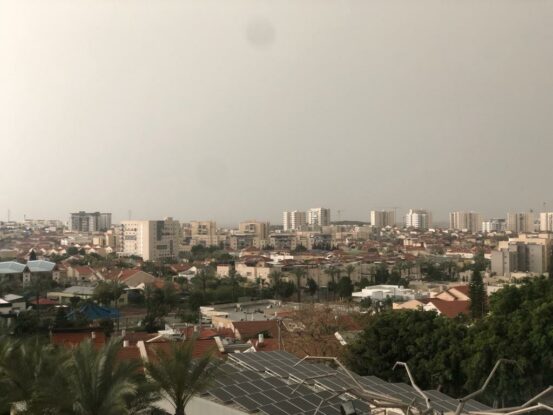Along with the physical and psychological wounds, hundreds of assets were damaged during Operation Shield and Arrow. The Tax Authority is responsible for compensating property owners for damage to homes due to wartime actions. How does the mechanism work? And who is responsible for compensating property owners for the contents of the apartment? Read on for all the answers, which hopefully you’ll never need.
Operation Shield and Arrow, which ended last week, claimed the lives of two Israelis and resulted in several dozen injuries on the Israeli side. However, in addition to the physical and emotional effects, the more than 1,000 rockets fired from the Gaza Strip during the operation also caused damage to several hundred properties, including residential homes, commercial areas, and offices.
On Sunday, immediately after the ceasefire was declared, the Association of Renovation Contractors announced that during the operation, 123 buildings and apartments were reported to have been damaged, and it is estimated that the number will reach more than 250 buildings by the end of the inspections. In the greater Tel Aviv area, more than 75 buildings were damaged, and in the greater Ashkelon area, more than 50 structures were damaged by rocket fire, shrapnel, and fire.
These reports were based on reports reported by civilians throughout the fighting to the Tax Authority, which, not inconsequentially, is responsible for compensating property owners injured during wartime. The reason for this is a law enacted in the 1960s, called the Property Tax and Compensation Fund Law. The law included two main chapters, one relating to the imposition of property tax on owners of real estate properties, and the other relating to the establishment of a fund to compensate property owners damaged as a result of war – which was also imposed on the Tax Authority, within the framework of the same law. Over the years, almost nothing remains of the first part of the law, and in Israel today almost no property tax is levied, except in unique and rare cases. But one of the results of binding the two topics together is that in common language the term “property tax” has been established as the body to turn to in case of war damage.
The law defines war damage as “damage caused to the body of property as a result of acts of war by the regular armies of the enemy or as a result of other hostilities against Israel or as a result of acts of war by the IDF.” In 2014, the law was amended to include damage to property carried out as part of “price tag” operations against the Palestinian population in Judea and Samaria, for which compensation can be demanded from the state.
According to the latest estimates, all of the damage caused by Operation Shield and Arrow to property (real estate assets and cars) is expected to amount to a total of just under NIS 100 million. This amount is significantly lower than that of Guardian of the Walls, which took place two years ago when the damage was estimated at NIS 200 million.
It should be noted that a building insurance policy, of the kind that every property owner is obligated to purchase, does not cover damage from war including missile damage, and stated, the address for claims is the property tax compensation fund. So what is the process that takes place when a landlord discovers that his apartment has been damaged as a result of the fighting? According to Eran Siv, chairman of the Association of Renovation Contractors, in such a case, “one should immediately contact the property tax call center in order to report the damage to the home. The property tax compensation fund then sends an appraiser on its behalf to inspect the injury and assess the damage.”
Such a request must be made as close as possible to the event of injury. Any waiting may subsequently lead to claims of inaccuracies in the damage estimate. Following the request, a property tax team, usually including an appraiser and an engineer, is sent to the site to assess the extent of the damage and the repairs and work that must be carried out in order to restore the situation to its previous state.
After approval of the damage by the Tax Authority, apartment owners have two options. The first is damage treatment by independent renovation contractors commissioned by the property owner, after receiving a quote on their behalf and approval by the Property Tax Compensation Fund. If the property owner rushes to order the work without first confirming it with the fund’s personnel – he may not receive the full amount he spent on the work afterward. A second option available to property owners is for the work to be carried out directly through companies on behalf of the property tax fund.
And what about the contents of the apartment? Here, too, property tax provides insurance coverage for the damage to contents of the home. However, it is important to note that this is usually up to a certain ceiling. Thus, if the apartment contains especially expensive objects, such as works of art of high value, and things of this kind – the damages may not be covered. In such a case, it is possible to purchase an extension to the private home insurance policy in order to provide expanded coverage in case of damage from war.
Damage to property as a result of military activities is indeed a very unpleasant experience, but such property can be repaired or replaced. Damage to the body and mind is much more difficult, in fact impossible, to be compensated for. It can only be hoped that the ceasefire agreement will remain in place and will obviate the need to operate the property tax compensation fund for many years to come.
Interested in special offers and discounted new projects across Israel? Whether you’re purchasing a vacation apartment or retirement residence, making a financial investment, or thinking about Aliyah, drop us a line, when you’re ready to talk. Whatever the reason, Buyitinisrael!



